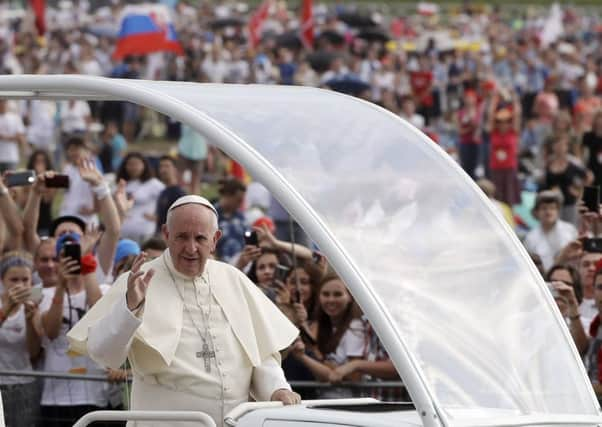Anthony Horan: Faith of our fathers guides in turbulent times


The political landscape in Scotland and the UK has rarely transfixed global media and international audiences as it has in recent weeks. The outcome of the Referendum on membership of the European Union has dominated the news cycle endlessly and engaged voters of all ages, creeds, nationalities and backgrounds.
Inevitably, given the nature and scale of the challenges at home and abroad facing our elected representatives, including economic security and trade, migration, education and medical ethics, it is unsurprising that their values, track records and proposals have been subject to intense scrutiny.
Advertisement
Hide AdAdvertisement
Hide AdIndeed, it seems society is in a state of flux. Faith and belief in a constant and ever-loving God can guide us in such times of deep uncertainty, and opportunity.
Yet whilst issues of belief and faith, in how human beings perceive the world have rarely been so important in society, they have perhaps never been so poorly understood. Indeed, increasing calls for the removal of religion and faith from public life continue to fill columns in our newspapers and social media.
But faith in and of itself is not just important for human flourishing and the renewal of society, rather society can best flourish if faith is given freedom to make its unique contribution.
As Pope Francis has said, “Our various religious traditions serve society primarily by the message they proclaim. They call individuals and communities to worship God, the source of all life, liberty and happiness”.
”Religious freedom” he said, “certainly means the right to worship God, individually and in community, as our consciences dictate. But religious liberty, by its nature, transcends places of worship and the private sphere of individuals and families.” Indeed, Pope Francis has warned against modern tyrannical societies which “seek to suppress religious freedom, or try to reduce it to a sub-culture without right to a voice in the public square.”
Faith should be allowed to play a role in public life. The legacy of Christianity is to uphold the respective competencies of the spiritual and the temporal.
Unsurprisingly, however, some commentators have sought to exploit recent Scottish Social Attitudes survey figures which suggests that over half of respondents do not identify with a church or religion, as an indicator of society’s declining religiosity – a reason to remove God, once and for all, from public life.
However, the fact that increasing numbers of people no longer tick a “church” box on census forms doesn’t mean they are not interested in the spiritual dimension of life or religious belief.
Advertisement
Hide AdAdvertisement
Hide AdIndeed, the national census still shows that most Scots consider themselves Christian, while an overwhelming majority describe themselves as “spiritual”.
Globally the Catholic Church continues to see growth. In Scotland, there are currently more students studying for the priesthood than at any time in the last ten years, while the number of Catholics measured by the National Census increased between 2001 and 2011.
As newly appointed Parliamentary Officer, my mission is to promote our faith and Catholic Social Teaching in a way that positively engages the secular society in which we live.
We need to reach out to all people and an important part of this will be working with young people to tap into their energy and enthusiasm; they are the future of our Church and of our country.
I am looking forward to meeting politicians and other stakeholders and building positive, friendly relationships with a view to developing ways to promote Church teaching in the political environment.
The Catholic Church in Scotland is devoted to the common good and has the wellbeing of all people at her heart.
Enshrined in our Catholic faith is a commitment to bear witness to Christ in our daily lives, at home and in public.
In my role I will work for the Bishops of Scotland, the Catholic church and people of all faiths and none, striving to respect and uphold the dignity of each person, particularly the weakest and most vulnerable; upholding the value of all human life from conception to natural death; cherishing the family as the fundamental unit of our society; advocating social and economic justice for all; and caring for the common home we inhabit.
Advertisement
Hide AdAdvertisement
Hide AdScotland is a diverse, vibrant and politically engaged nation with a rich social, economic and political history.
Faith and religious belief in the public square can play a role in shaping a resilient Scotland in the future. It should be welcomed and valued, without fear or favour.
As Pope Francis said: “We are all Political animals, with a capital P. We are called to constructive political activity among our people.”
• Anthony Horan is Parliamentary Officer for the Bishops Conference of Scotland